What does duly noted mean in English? Is it a formal term that should mostly be reserved for formal settings, or is it applicable or acceptable to use in casual settings and conversations too, like over a text message?
To use duly noted correctly, pay due attention to what’s written below, (and take note).
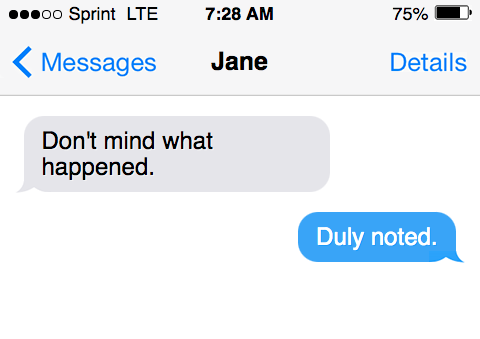
What does duly noted mean?
Answer: To say something has been ‘duly noted,’ means that (whatever the subject,) it’s been given appropriate consideration and mental thought by the person or people receiving the information or proposal.
Duly noted is more common in a professional context, and is not as frequently used in a less formal setting, (like casual conversations, or text message conversation.) It’s possible that in informal and casual settings, saying the expression duly noted can come across as slightly rude or short.
That said, whether it’s interpreted as rule or polite depends mostly on the context, and whether there are any underlying undertones (like sarcasm), which someone may pick up on.
What’s the dictionary definition of duly noted?
Merriam-Webster defines the expression as: “A way of saying that something is “officially recognized” or “understood in full.”
What is an adverbial phrase?
Duly noted is an adverbial phrase; which is a group of words that “function as an adverb.” Different from an adverbial clause, adverbial phrases do not need to have a subject and verb.
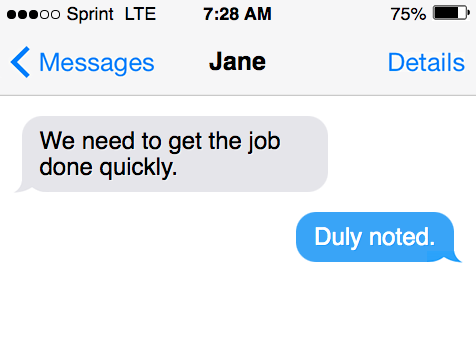
Examples of adverbial phrases:
- “She woke up early in the morning.”
- “Jack said he did not want more food in a polite way.”
- “Sean was screaming very loudly.”
- “It’s not polite to speak to people in that tone.”
- “The whole team worked very hard to get the job done right.”
See that in the sentences above these adverbial phrases work like a regular adverb would. The different is that adverbial phrases use a small group or combination of words as opposed to a single word or adverb.
To better understand, ‘duly noted,’ we should focus on the individual words which make up the expression.
What does ‘duly’ mean?
According to Dictionary.com, the word duly is an adverb that means to do something at the correct time, “in a correct or appropriate manner; properly; fittingly,” or “at the right time; punctually.”
The first word ‘duly,’ has roots in the word due, which has various meanings depending on the context in which it’s used.

Due is an adjective that means:
- “Expected at or planned for a certain time”or,
- “Owed or owing as a debt,” or
- “Something that rightfully belongs to one.”
For example, under the first understanding of the ‘due,‘ (expected at or planned for a certain time), is commonly used in the term ‘due date,’ that refers to a woman’s expected date of giving birth.
A frequently asked question in school and university is “when is the assignment due?” Meaning, what’s the deadline, or when does the work have to be submitted.
Due under the third definition, “Something that rightfully belongs to one,” is seen in the expressions “give him his due,” or “give her her due.” This means to give them what they are owed, and what rightfully belongs to them.
Quick refresher!
In grammar, adverbs modify adjectives, verbs and other adverbs. For example, in the following sentence, “Susan arrived early to dinner.” The word ‘early,’ functions as an adverb in modifying or adding further detail to the subject’s action.
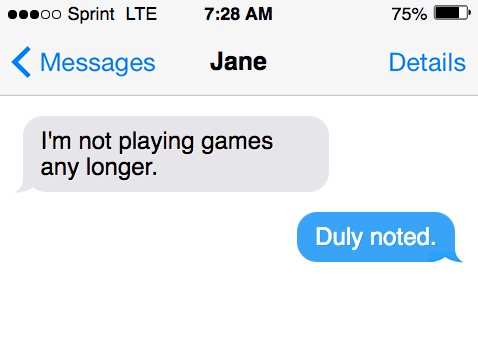
What does ‘noted’ mean?
Noted is an adjective meaning “well-known by reputation,” “eminent,” and/or “celebrated.”
In its noun form, ‘noted,’ is modified to notedness. In its adverb form, ‘noted‘ modifies to notedly.
Is it ‘duelly noted,’ ‘dully noted’ or ‘dually noted’?
Incorrect: Dually noted, dully noted and duelly noted are all incorrect misspellings of duly noted.
‘Duly noted,’ has common misspellings in English writing: ‘dually noted,’ ‘duelly noted,’ and sometimes it’s written ‘dully noted.’
To say something is ‘dually noted,’ makes no sense in English (though technically speaking, it could refer to something as having been noted twice or multiple times).
Dual refers to something that’s made up of two parts, or involves two elements; and dually is the adverb form of dual, and means, “in a way that relates to or involves two people, items, parts, etc.”
To say something is ‘dully noted,’ is incorrect spelling because of the second l. Do not confuse duly with dully; as Dull is an adjective that describes a noun or action as “not lively or spirited; listless.”
All of these are incorrect and don’t mean anything in the English language. The proper way, and only correct way to spell the phrase is ‘duly noted.’
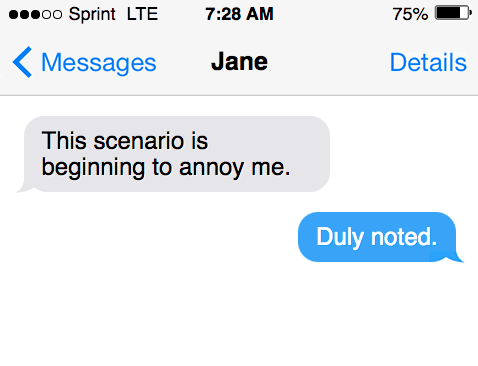
Sentences that use duly noted
- “Your request to gain early entry to the soccer game has been duly noted and denied.”
- “Ashley’s complaints about her meal have been duly noted and passed on to to the restaurant manager.”
- “The teacher’s comments on the student’s essays were duly noted by each student in the class.”
- “The jury had duly noted all the relevant details to consider for further deliberation to arrive at a verdict for the case.”
- “The final grades for each student in the class had been duly noted and recorded in the school filing system.”
- “Your concerns with the hotel’s services have been recorded and duly noted.”
- “The secretary duly noted all of the meeting minutes in her notebook.”
- “The customer representative took down all the customer feedback and made sure they were duly noted in comments.”
Synonyms for duly noted
The following expressions share a similar meaning with duly noted:
- Taken into account
- Taken into consideration
- Properly recorded
- Acknowledged/acknowledge
- Confirmed
- Point taken
- Note taken
- Officially documented/recorded appropriately.
Antonyms for duly noted
The following expressions have the opposite meaning of duly noted:
- Pay no notice
- Pay no mind
- Pay no attention
- Disregard/Disregarded
- Unacknowledged
Origin of duly/due
Due comes from the Old French word deu, “to owe.”
Deu derives from the Latin debere, ‘to owe.’ To do something in due time, or at the appropriate time, in due manner, are phrases that use the root of duly i.e., due and have been used since the late 14th century.
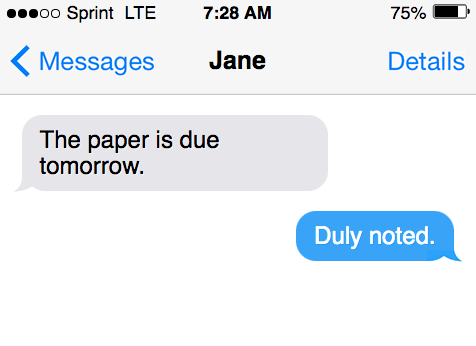
Origin of noted
The origin of the word noted derives from the Old French, noter, meaning to “indicate, designate; take note of, write down.”
This was passed down from the Latin, notare, “to mark, note, make a note.”
Is duly noted rude?
Duly noted is not inherently or purely rude expression. Like most expressions in and idioms, it all depends on the context in which it’s used. When things are said in a sarcastic or facetious manner, for example, this is often interpreted as rude.
In its sarcastic usage, people might respond with the expression duly noted when receiving information or unsolicited advice from others.
The novel Identity by Ingrid Thoft demonstrates the sarcastic tone and context of duly noted in a conversation between two characters:
“I didn’t take that many, but your concern is duly noted.”
” ‘Duly noted’ usually means ‘heard and ignored.'”
“Well, ‘heard’ is a start, right?” —Identity, Ingrid Thoft (2014)
Example of duly noted in articles and the news
- “But the building is in a historic district, and the Landmarks Preservation Commission duly noted that the change had taken place without a permit.”as seen in The New York Times article, “A Beauty? Or a Menace With a Fiendish Grasp?” written by Christopher Gray in 2012.
- “The creeping influence of Korea’s Pop industry has been duly noted by journalists, fans, and artists.” as seen in the article, “A Dummy’s Guide to Korean pop” by Allen Huang.
- “They have a nice variety of gluten-free items available, duly noted on their menu.” as seen in the article, “Foods You Can Eat on a Gluten-Free Diet,” on Healthline.
- “Again Ilitch told Richner and Newman that their concerns were duly noted.” as seen in The Ann Arbor Chronicle, “GSRA Bill: UM Regents Debate Opposition” by Mary Morgan in 2012.
Duly noted in media/pop culture
An article that featured in Deseret News mentions duly noted. Deseret News is a longstanding news and media organization in Utah. The article is written by Brandon Gurney, and is titled “BYU men’s volleyball: Underwood and others play key roles behind the scenes,” he writes,
“It’s a contribution duly noted by head coach Shawn Olmstead, who gets a bit emotional when talking about the contributions made by his less-heralded group of seniors.”
See here in the context above, duly noted implies a simple acknowledgment or consideration of the contributions made by the “less-heralded group of seniors,” (playing on BYU’s volleyball team).
In Review
The correct term is duly noted.
The statement expresses that either an appropriate record is taken, or appropriate consideration has been given to the subject matter/topic.
Duly noted is often used in a professional context to communicate a simple acknowledgment, or that something has been addressed/understood to the full extent.
Glossary
- Definition of duly noted: https://www.merriam-webster.com/words-at-play/duly-noted-what-does-it-
- Definition of due: https://www.merriam-webster.com/dictionary/due
- Meaning of duly: https://www.dictionary.com/browse/duly
- Etymology of due: https://www.etymonline.com/word/duly
- Etymology of note: https://www.etymonline.com/word/note
- Definition of adverbial statement: https://www.learngrammar.net/english-grammar/adverb
- Definition of adverb: https://www.learngrammar.net/english-grammar/adverb
Don’t stop learning now!
Keep at it while you’re ahead!
Do you know when to use breath vs. breathe? What about the difference between a city and a town, or village? Curious to learn the correct plural form of moose? What about when to use a comma before ‘but‘? So, do you capitalize after a colon? What’s Correct?
Learn all of the above and more.
Sources
- Duly noted: https://www.merriam-webster.com/words-at-play/duly-noted-what-does-it-
- Identity by Ingrid Thoft: https://www.goodreads.com/author/show/6862951.Ingrid_Thoft
- “BYU men’s volleyball: Underwood and others play key roles behind the scenes,” by Brandon Gurney: https://www.deseret.com/2016/4/29/20587558/byu-men-s-volleyball-underwood-and-others-play-key-roles-behind-the-scenes
- “A Beauty? Or a Menace With a Fiendish Grasp?” written by Christopher Gray in 2012. https://www.nytimes.com/2012/02/26/realestate/greenwich-village-streetscapes-ivy-reviled-admired-and-lately-imitated.html
- “A Dummy’s Guide to Korean pop” by Allen Huang: http://www.ssgmusic.com/a-dummys-guide-to-korean-pop/
- “Foods You Can Eat on a Gluten-Free Diet,” on Healthline: https://www.healthline.com/nutrition/gluten-free-foods
- The Ann Arbor Chronicle, “GSRA Bill: UM Regents Debate Opposition” by Mary Morgan in 2012: https://annarborchronicle.com/2012/02/21/gsra-bill-um-regents-debate-opposition/index.html
Inside this article
Fact checked:
Content is rigorously reviewed by a team of qualified and experienced fact checkers. Fact checkers review articles for factual accuracy, relevance, and timeliness. Learn more.
Core lessons
Glossary
- Abstract Noun
- Accusative Case
- Anecdote
- Antonym
- Active Sentence
- Adverb
- Adjective
- Allegory
- Alliteration
- Adjective Clause
- Adjective Phrase
- Ampersand
- Anastrophe
- Adverbial Clause
- Appositive Phrase
- Clause
- Compound Adjective
- Complex Sentence
- Compound Words
- Compound Predicate
- Common Noun
- Comparative Adjective
- Comparative and Superlative
- Compound Noun
- Compound Subject
- Compound Sentence
- Copular Verb
- Collective Noun
- Colloquialism
- Conciseness
- Consonance
- Conditional
- Concrete Noun
- Conjunction
- Conjugation
- Conditional Sentence
- Comma Splice
- Correlative Conjunction
- Coordinating Conjunction
- Coordinate Adjective
- Cumulative Adjective
- Dative Case
- Determiner
- Declarative Sentence
- Declarative Statement
- Direct Object Pronoun
- Direct Object
- Diction
- Diphthong
- Dangling Modifier
- Demonstrative Pronoun
- Demonstrative Adjective
- Direct Characterization
- Definite Article
- Doublespeak
- False Dilemma Fallacy
- Future Perfect Progressive
- Future Simple
- Future Perfect Continuous
- Future Perfect
- First Conditional
- Irregular Adjective
- Irregular Verb
- Imperative Sentence
- Indefinite Article
- Intransitive Verb
- Introductory Phrase
- Indefinite Pronoun
- Indirect Characterization
- Interrogative Sentence
- Intensive Pronoun
- Inanimate Object
- Indefinite Tense
- Infinitive Phrase
- Interjection
- Intensifier
- Infinitive
- Indicative Mood
- Participle
- Parallelism
- Prepositional Phrase
- Past Simple Tense
- Past Continuous Tense
- Past Perfect Tense
- Past Progressive Tense
- Present Simple Tense
- Present Perfect Tense
- Personal Pronoun
- Personification
- Persuasive Writing
- Parallel Structure
- Phrasal Verb
- Predicate Adjective
- Predicate Nominative
- Phonetic Language
- Plural Noun
- Punctuation
- Punctuation Marks
- Preposition
- Preposition of Place
- Parts of Speech
- Possessive Adjective
- Possessive Determiner
- Possessive Case
- Possessive Noun
- Proper Adjective
- Proper Noun
- Present Participle
- Prefix
- Predicate



